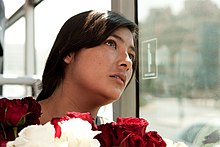
The Milk of Sorrow
As reported by Dollyforme
The virus situation has limited my movie watching both in Redbox and in the theatre. Lucky for me I have a movie collection and I’ll share this gem of a movie I found in it.
The Milk of Sorrow stars the lovely Magaly Solier - a Peruvian actress and recording artist. The film begins with a song sung by an elderly woman who lies dying in her bed. She describes her own rape and the death of her husband. At the end of the song, she slowly passes away while lying next to her daughter, Fausta (Magaly Solier). It is assumed that Fausta has grown up on stories of the horrors that occurred during the conflict between Sendero Luminoso, a guerrilla group, and the Peruvian government. This has left Fausta with a crippling fear of men and rape. To dissuade any attempts of rape, she has placed a potato in her vagina.
Throughout the film, this potato begins to impact her health yet she continues to refuse to allow the doctors to remove it. In the aftermath of her mother's death Fausta and her family do not have enough money to take her mother's body back to their village for burial. Fausta takes work in the home of a wealthy pianist, Aída (Susi Sánchez) who is struggling to complete a new piece in time for an upcoming recital. When the pianist discovers that Fausta has a knack for writing her own songs, Aída encourages her to complete a song for her by offering a string of pearls in exchange. Fausta desperately needs this money in order to pay for her mother's funeral and agrees. The night of the recital, Aída performs Fausta's song to a roaring applause. On the way back to Aida's home after the recital, Fausta comments about the positive reception that the song received. Aída is afraid Fausta will say something that will let the driver know Aida is not the composer and responds by kicking Fausta out into the dark streets of Lima by herself.
The night after her cousin's wedding, Fausta's uncle comes into her room and frightens her while she sleeps. He begs her to live her life and not waste her days in a state of never-ending fear like her mother did. At the end of the film, Fausta decides to go through with the operation to get the potato removed and buries her mother near the ocean. It is implied that Fausta will move on with her life, leaving her fears behind her.
Note: this movie is based on Perun between 1980 and 1992 Peru experienced a period of extreme violence, particularly in the Andean region, because of the uprising of the Sendero Luminoso and the actions of the paramilitary and state armed forces. By 1990 the conflict had reached Lima, the capital city of Peru. Claudia Llosa refers in her film to the folk belief that the trauma experienced by women who were raped by members of security force was passed on to their children through their breast milk. Thus, this period of violence continues to affect not only those who experienced it but also the next generation.
Llosa's work is a psychological as well as sociological approach to the 12 years of conflict, and is critical of the mass rapes used by the army as a strategy of war. The film is based on the book Entre Prójimos, by Kimberly Theidon. In her book, Theidon documents a number of testimonials by women who were raped by as many as thirty men at a time, atrocities that often resulted in pregnancies. Theidon states that "when survivors of sexual violence speak about their experiences, they place a responsibility on their listeners to respond to what they have heard.” So then, Llosa's film, too, is an attempt to respond to such testimonies. A big learning experience for me, just not a happy film. A big thumbs up if you can find it and you like indie films.



